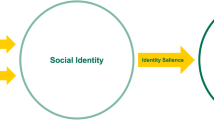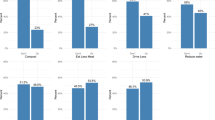Abstract
An emerging body of research proposes that climate change concern is shaped by one’s social ties and cultural milieu1,2,3. This work aligns with findings in the well-established field of social network analysis, whereby individuals are understood as being embedded in social networks, and network position can be used to predict attitudes4,5. Here we examine whether having ties to environmental movement organization members is correlated with climate change attitudes amongst the general public. We use data from a nationwide survey of the Canadian public to demonstrate that having social ties to environmental organization members increases the likelihood that an individual member of the public has a plan to deal with climate change. These findings reinforce the value of focusing on social context when examining climate change attitudes, and highlight the role that environmental organization members play in mobilizing climate change responses.
This is a preview of subscription content, access via your institution
Access options
Subscribe to this journal
Receive 12 print issues and online access
$209.00 per year
only $17.42 per issue
Buy this article
- Purchase on Springer Link
- Instant access to full article PDF
Prices may be subject to local taxes which are calculated during checkout

Similar content being viewed by others
References
Kahan, D. M. et al. The polarizing impact of science literacy and numeracy on perceived climate change risks. Nature Clim. Change 2, 732–735 (2012).
Brody, S. D., Zahran, S., Vedlitz, A. & Grover, H. Examining the relationship between physical vulnerability and public perceptions of global climate change in the United States. Environ. Behav. 40, 72–95 (2007).
Norgaard, K. M. Living in Denial (MIT Press, 2011).
Borgatti, S. P., Mehra, A., Brass, D. J. & Labianca, G. Network analysis in the social sciences. Science 323, 892–895 (2009).
Erickson, B. H. in Soc. Struct. A Netw. Approach (eds Wellman, B. & Berkowitz, S. D.) 99–122 (Cambridge Univ. Press, 1988).
Bord, R. J., O’Connor, R. E. & Fisher, A. In what sense does the public need to understand global climate change? Public Underst. Sci. 9, 205–218 (2000).
Heath, Y. Free-market ideology and environmental degradation: The case of belief in global climate change. Environ. Behav. 38, 48–71 (2006).
Leiserowitz, A. A. Climate change risk perception and policy preferences: The role of affect, imagery, and values. Climatic Change 77, 45–72 (2006).
Friedkin, N. E. & Johnsen, E. C. Social Influence Network Theory: A Sociological Examination of Small Group Dynamics (Cambridge Univ. Press, 2011).
McPherson, M., Smith-Lovin, L. & Cook, J. Birds of a feather: Homophily in social networks. Annu. Rev. Sociol. 27, 415–444 (2001).
Emirbayer, M. & Goodwin, J. Network analysis, culture, and the problem of agency. Am. J. Sociol. 99, 1411–1454 (1994).
Granovetter, M. The impact of social structure on economic outcomes. J. Econ. Perspect. 19, 33–50 (2005).
Smith, K. P. & Christakis, N. A. Social networks and health. Annu. Rev. Sociol. 34, 405–429 (2008).
Coleman, J. Social capital in the creation of human capital. Am. J. Sociol. 94, 95–120 (1989).
Diani, M. & McAdam, D. Social Movements and Networks: Relational Approaches to Collective Action (Oxford Univ. Press, 2003).
Diani, M. in The Blackwell Companion to Social Movements (eds Snow, D. A., Soule, S. A. & Kriesi, H.) 339–359 (Blackwell Publishers, 2004).
Dunlap, R. E., Van Liere, K. D., Mertig, A. G. & Jones, R. E. New trends in measuring environmental attitudes: Measuring endorsement of the new ecological paradigm: A revised NEP scale. J. Soc. Issues 56, 425–442 (2000).
Knoke, D. Political Networks: The Structural Perspective (Cambridge Univ. Press, 1990).
Benford, R. & Snow, D. Framing processes and social movements: An overview and assessment. Annu. Rev. Sociol. 26, 611–639 (2000).
Snijders, T. A. B., van de Bunt, G. G. & Steglich, C. E. G. Introduction to stochastic actor-based models for network dynamics. Soc. Networks 32, 44–60 (2010).
Shellenberger, M. & Nordhaus, T. Break Through: From the Death of Environmentalism to the Politics of Possibility (Houghton Mifflin, 2007).
Shellenberger, M. & Nordhaus, T. The Death of Environmentalism: Global Warming Politics in a Post-Environmental World (Breakthrough Institute, 2004).
Cohen, M. J. “The death of environmentalism”: Introduction to the symposium. Organ. Environ. 19, 74–81 (2006).
Fisher, D. R. Activism, Inc.: How the Outsourcing of Grassroots Campaigns Is Strangling Progressive Politics in America (Stanford Univ. Press, 2006).
Shaiko, R. G. Voices and Echoes for the Environment: Public Interest Representation in the 1990s and Beyond (Columbia Univ. Press, 1999).
Brulle, R. & Jenkins, J. Spinning our way to sustainability? Organ. Environ. 19, 82–87 (2006).
Brulle, R. Agency, Democracy, and Nature: The US Environmental Movement from a Critical Theory Perspective (MIT Press, 2000).
Fox, J. Applied Regression Analysis and Generalized Linear Models (Sage Publications, 2008).
Allison, P. Missing Data (Sage Publications, 2002).
Marsden, P. Network data and measurement. Annu. Rev. Sociol. 16, 435–463 (1990).
Acknowledgements
Research for this paper was financially supported by several research grants from the Social Sciences and Humanities Research Council of Canada. G.P. received a fellowship from the Pacific Institute of Climate Solutions while working on this study. We would like to thank M. Stoddart, J. Robinson, T. Malinick and A. Streilein for their assistance with the survey of environmental organization members; and also R. Wilkes, N. Guppy, M. Diani, D. Fisher, S. Sheppard and J. Broadbent for their helpful advice on this project, and earlier versions of this paper. We would like to thank Venture Market Research Corporation—and, in particular, B. Killip and I. Darling—for their assistance with the survey of the general public.
Author information
Authors and Affiliations
Contributions
D.B.T. contributed to all aspects of this paper, including study design, data collection, statistical analysis and writing. G.P. contributed to statistical analysis and writing.
Corresponding author
Ethics declarations
Competing interests
The authors declare no competing financial interests.
Supplementary information
Rights and permissions
About this article
Cite this article
Tindall, D., Piggot, G. Influence of social ties to environmentalists on public climate change perceptions. Nature Clim Change 5, 546–549 (2015). https://doi.org/10.1038/nclimate2597
Received:
Accepted:
Published:
Issue Date:
DOI: https://doi.org/10.1038/nclimate2597
This article is cited by
-
Climate change experiences raise environmental concerns and promote Green voting
Nature Climate Change (2022)



